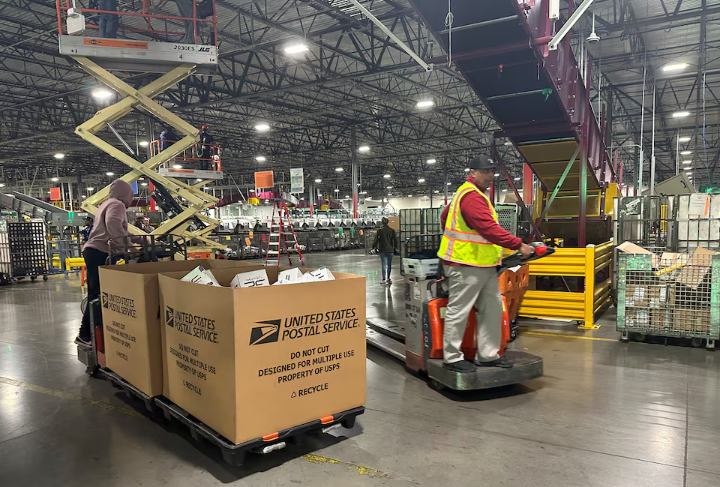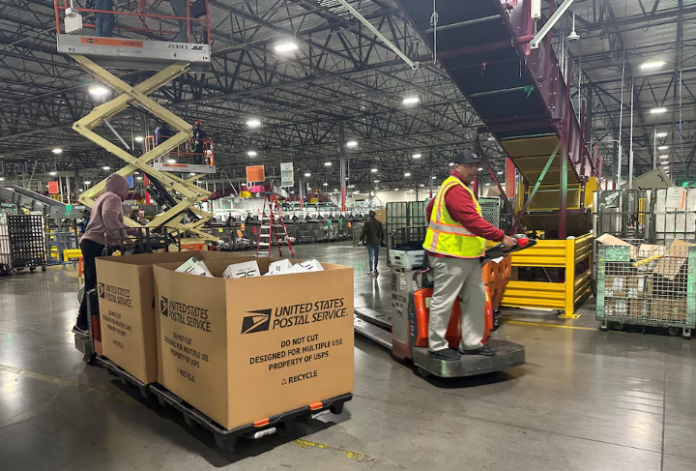In a move set to disrupt global e-commerce, the U.S. Postal Service (USPS) has announced a temporary suspension of inbound parcels from China and Hong Kong. This decision follows President Donald Trump’s recent termination of a key trade provision, commonly known as the “de minimis” exemption, which previously allowed low-value packages (under $800) to enter the U.S. duty-free. Retail giants like Shein, Temu, and Amazon Haul heavily relied on this loophole to keep costs low and shipments flowing.
Why the Sudden Change?
The Trump administration’s crackdown isn’t just about tariffs. An additional 10% tariff on Chinese goods took effect on Tuesday, and the elimination of the de minimis exemption is part of a broader strategy aimed at pressuring Beijing.
Trump has long accused China of failing to curb the flow of fentanyl—a dangerous synthetic opioid—into the U.S. Reuters previously reported that some Chinese suppliers exploited the de minimis rule to discreetly ship chemicals for fentanyl production by mislabeling them as low-cost items like gadgets.
How Will This Affect E-commerce Giants?
This suspension is a significant blow to fast-growing retailers like Shein and Temu, whose business models thrive on offering affordable products directly from Chinese manufacturers. Together, these companies account for over 30% of all daily shipments to the U.S. under the de minimis provision. In 2024 alone, analysts estimated that four million de minimis packages were shipped to the U.S. every day.
However, industry experts believe that the long-term impact might not be as severe as it seems. Ram Ben Tzion, founder of the digital shipment vetting platform Publican, noted, “I expect this to be a temporary measure, eventually replaced by more refined regulations.” Logistics experts also emphasize that while prices may rise, Chinese e-commerce goods will still likely be cheaper than their U.S. counterparts. The biggest challenge, they say, will be dealing with operational delays.
What Does This Mean for U.S. Consumers?
If you’ve recently ordered from Shein, Temu, or Amazon sellers based in China, you might be in for a long wait. The USPS has not provided a clear timeline for when normal parcel services will resume. While letters and small mail (up to 15 inches long) are unaffected, larger parcels are stuck in limbo.
“I came to check the status of a package I sent to the U.S., but the post office can’t even tell me where it is,” said John Khan, a Hong Kong-based businessman. “This political conflict is affecting regular people like us, not just big businesses.”
What Are Companies Doing to Cope?

Logistics companies are advising sellers to rethink their strategies. Easyship, a global logistics provider, recommended that businesses set up distribution centers within the U.S. or partner with local warehouses to bypass these new hurdles. Meanwhile, major couriers like FedEx and SF Express continue to ship parcels to the U.S., providing a temporary workaround for some.
Retailers are also adapting. Shein and Temu are diversifying their supply chains by sourcing more products outside of China, opening U.S.-based warehouses, and onboarding more American sellers to reduce reliance on Chinese shipments.
The Bigger Picture
This suspension is just one part of a larger trade tension between the U.S. and China. In another potential blow to Chinese e-commerce, the U.S. is considering adding Shein and Temu to its Department of Homeland Security’s forced labor list. If this happens, it could further complicate their ability to operate in the U.S. market.
China’s foreign ministry has called for dialogue and cooperation to resolve these issues, emphasizing that addressing domestic drug demand and enhancing international law enforcement collaboration are the keys to tackling the fentanyl crisis.
For now, shoppers and sellers alike will need to brace for potential delays and rising costs as this trade dispute unfolds.



